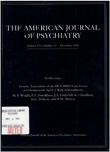Antisocial personality disorder in abused and neglected children grown up
Abstract
OBJECTIVE: the authors' goal in this study was to examine the extent to which having been abused and/or neglected in childhood raises a person's risk for having an adult DSM-III-R diagnosis of antisocial personality disorder. METHOD: Children who had experienced substantiated child abuse and/or neglect from 1967 to 1971 in a Midwestern metropolitan county area were matched on the basis of age, race, sex, and approximate family social class with a group of nonabused and nonneglected children and followed prospectively into young adulthood. Subjects were located and participated in a 2-hour interview consisting of a series of structured and semistructured questions, rating scales, and a psychiatric assessment using the National Institute of Mental Health Diagnostic Interview Schedule. Interviews were completed with 699 young adult subjects (416 abused and/or neglected and 283 comparison subjects). RESULTS: Childhood victimization was a significant predictor of the number of lifetime symptoms of antisocial personality disorder and of a diagnosis of antisocial personality disorder, despite the fact that controls for demographic characteristics and arrest history were introduced. CONCLUSIONS: These findings suggest the importance of inquiring about a patient's childhood history of abuse and/or neglect when antisocial symptoms are evident. In addition to speculation about a possible saturation model for the consequences of childhood victimization, these findings also reinforce a multiple causation model of antisocial personality disorder.
Access content
To read the fulltext, please use one of the options below to sign in or purchase access.- Personal login
- Institutional Login
- Sign in via OpenAthens
- Register for access
-
Please login/register if you wish to pair your device and check access availability.
Not a subscriber?
PsychiatryOnline subscription options offer access to the DSM-5 library, books, journals, CME, and patient resources. This all-in-one virtual library provides psychiatrists and mental health professionals with key resources for diagnosis, treatment, research, and professional development.
Need more help? PsychiatryOnline Customer Service may be reached by emailing [email protected] or by calling 800-368-5777 (in the U.S.) or 703-907-7322 (outside the U.S.).



